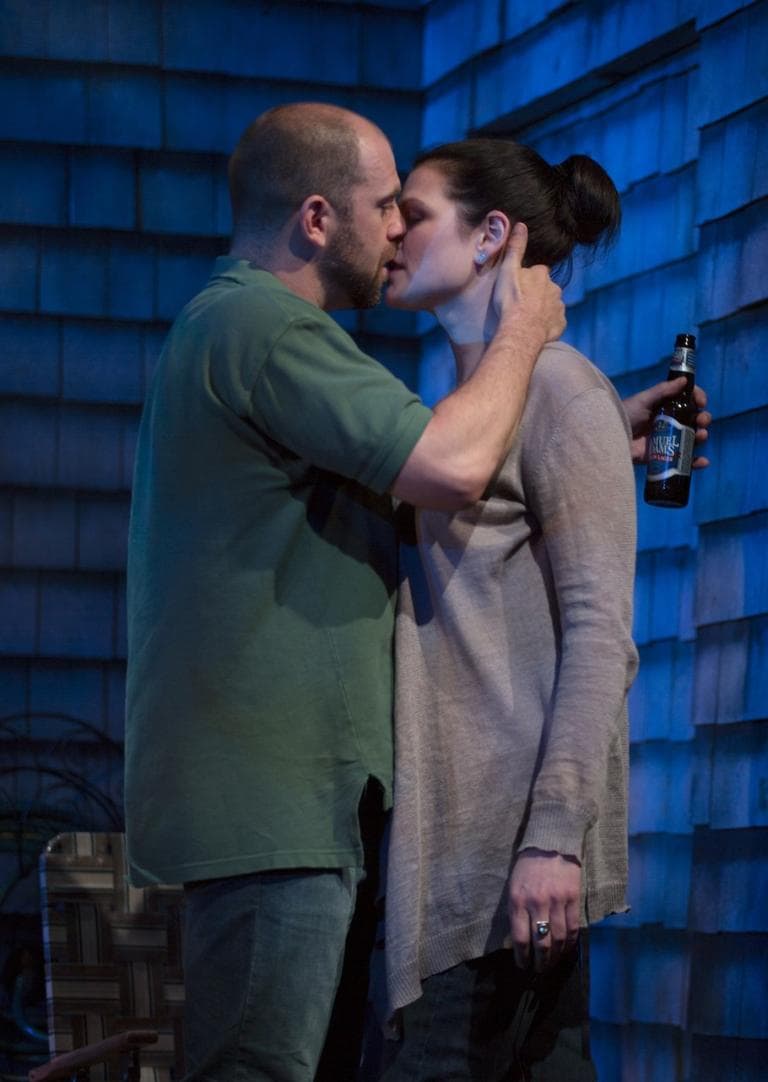Advertisement
'Rapture, Blister, Burn' — Betty Friedan, Look What You've Done
Toward the end of Gina Gionfriddo’s “Rapture, Blister, Burn” an older woman advises her daughter and her daughter’s student to go to New York where they can live the sitcom life of a Laverne and Shirley or Kate and Allie.
But why go to New York? They’ve pretty much been living in a sitcom world for the previous two hours in an unidentified New England college town. Granted, a very smart comedy. Maybe a PBS sitcom, if there were such a thing, what with all the talk about gender studies and deconstruction.
Or maybe an HBO sitcom. Here’s the pitch. “The Heidi Chronicles” meets “Girls.”
No sale? All right, let’s deal with the play we have in front of us then. It’s certainly an entertaining two hours of theater — nicely staged by Peter DuBois and his Huntington Theatre Company designers at the Boston Center for the Arts’ Wimberly Theatre (through June 30), well-acted, all the trimmings we’ve come to expect from the Huntington.
Catherine Croll (Kate Shindle) comes back to town to take care of her mother (Nancy E. Carroll) but finds herself in the middle of the unhappy marriage of Gwen (Annie McNamara) and Don Harper (Timothy John Smith) – and their babysitter, Avery, whom Gwen just fired because she has a black eye. Catherine has made a success of her life — she’s the hot doomsday chick on Bill Maher, although what her books about pop culture and feminism have to do with doomsday is never clear. Don was her intellectual equal in college, where they were a couple, but settled for domesticity, pornography and reefer. He’s also a low-level dean at a less than Ivy League university.

With Gwen and Don on the outs it’s easy to see where this is going, which isn’t to say that it’s unenjoyable watching them get there. For one thing, Gionfriddo isn’t all that interested in the soap opera elements of switching partners. What’s at stake here is the politics of feminism and the life choices that women have to make between work and family.
She has a sharp ear for dialogue and the personal exchanges among the characters are funny and sharp, particularly with a director and actors as talented as these to give them more bite than they have on the page. Though what's on the page was good enough to make the play a Pulitzer finalist.
There’s no covering, though, for how forced the story is. Does it really make sense for Gwen to fire Avery because she has a black eye that’s not the result of domestic violence? Or that Bill Maher’s “hot doomsday chick” can only attract two people to her class — Gwen and Avery?
Or are these plot contrivances that undermine Gionfriddo’s ability to deliver realistic characters and situations? Catherine, Gwen and Don—despite the actors’ abilities — feel forced into fortysomething straitjackets. The woman who sacrificed career for family. The woman who sacrificed family for career. The man who settled. And Catherine’s seminar musings over Betty Friedan and Phyllis Schlafly seem really stale, as if Gionfriddo is still stuck in the ‘80s.
Fortunately, Avery is not and Shannon Esper’s spot-on performance as a 21-year-old makes her the font of wisdom in the middle of the fortysomething muddle.
To Catherine’s whining about family vs. career, Avery confidently asks, “What’s wrong with 50-50.” I mean, duh. Catherine blathers on about 50-50 being fine, theoretically.
On why she’s not that interested in early feminism: “People thought the Earth was flat. They were wrong. We moved on.”
On pornography: “I don’t think you can be a feminist and be anti-porn.”
She also has smart things to say about holes in Catherine’s dull pop culture theory, sex without commitment and Schlafly until Gionfriddo has her start whining about getting dumped. Until then she gives postfeminism a good name, at least in Gionfriddo’s schematic.
Catherine’s mother, Alice, isn’t exactly a font of wisdom, but local hero Carroll makes her a delight, whether she’s dispensing some old-fashioned wisdom about men not buying the cow if they get the milk for free or saying that Schlafly was right about the women’s movement not being all that liberating.
By the end of the two hours I couldn’t care less about the three fortysomethings. But if they came up with Alice ‘n’ Avery – now that’s a sitcom I’d happily watch. At least if it had these two fine actors , Esper and Carroll, in the parts.
Here they are — along with the rest of the cast, Gionfriddo and DuBois — discussing the play:
This program aired on May 31, 2013. The audio for this program is not available.
